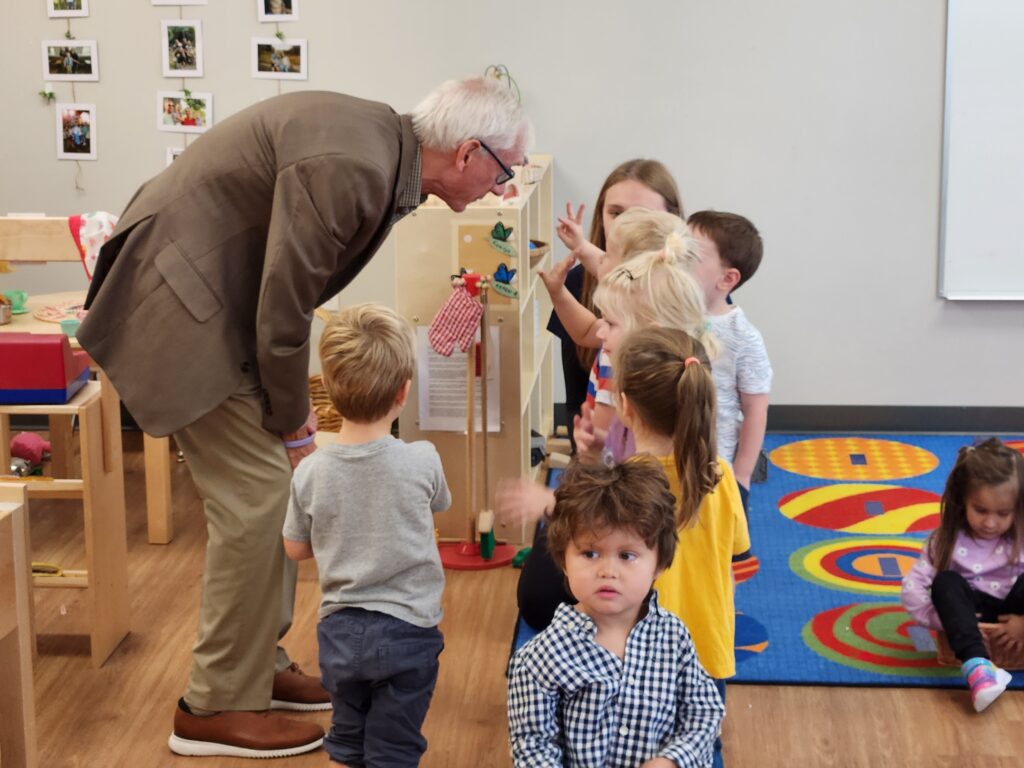Evers’ Child Care Proposal Might Get A Second Life
After inaction by GOP leaders, Senate quietly moves legislation forward.

Gov. Tony Evers meets children at Mariposa Learning Center in Fitchburg Wednesday, the day that lawmakers gaveled in a special session he called to address workforce needs, then gaveled back out without action. Photo by Erik Gunn for the Wisconsin Examiner.
In a surprise move, Senate leaders voted Thursday to formally introduce legislation sought by Gov. Tony Evers to fund Wisconsin’s child care providers.
The legislation, based on the draft bill that Evers put out six weeks ago, also includes provisions for a paid family leave program, additional higher education funding, and a state workforce development program.
The state Assembly also announced that its adjournment Wednesday after gaveling in and out of the special session Evers had called was “until 10 a.m. Tuesday” — suggesting that chamber’s leaders were leaving open the possibility of also taking up Evers’ proposals.
Both developments represented a dramatic shift after what had appeared Wednesday to be the collapse of Evers’ proposal and the special session itself as lawmakers in the Senate and the Assembly gaveled in and out in seconds.
The bill was formally introduced Thursday and assigned a designation as special session SB-1. The Senate Committee on Organization, consisting of three Republicans and two Democrats, all leaders in their party caucuses, voted 5-0 to introduce the measure, according to the legislative history posted Thursday.
The bill was referred to the Senate Committee on Economic Development and Technical Colleges, chaired by Sen. Dan Feyen (R-Fond du Lac). Feyen is also a member of the organization committee.
The bill includes a provision to extend the Child Care Counts program that bolstered the finances of child care providers during the COVID-19 pandemic and an additional program to assist employers in covering child care costs for their employees. In total the bill would provide $365 million for those initiatives.
Providers credited Child Care Counts with helping to stabilize and support their workforce with better wages without driving up tuition costs for families.
The only announcement of the bill’s introduction Thursday came from Feyen, who released a statement shortly after 4 p.m.
“There’s no question that Wisconsin faces workforce challenges and the state must step up to find solutions. Some of the issues included in this special session bill need to be addressed sooner rather than later to keep the Wisconsin economy on track,” Feyen stated.
“I plan on treating this bill the same as every other bill referred to this committee. I look forward to holding a public hearing and gathering input from the people of Wisconsin as we focus this legislation to have the greatest impact possible.”
Sen. Melissa Agard (D-Madison), the Senate minority leader, said Friday morning the information on Thursday that the bill would be formally introduced came as a surprise. “I was not expecting it,” she said.
Agard said she didn’t learn about the decision to formally introduce the bill and refer it to a committee until she recieved a paper ballot Thursday afternoon as member of the Senate organization committee, where she is the ranking Democrat. The other Democratic member on the committee is Sen. Jeff Smith (D-Brunswick). Republicans on the committee are Senate President Chris Kapenga (R-Delafield), Senate Majority Leader Devin LeMahieu (R-Oostberg) and Feyen.
The ballot was for the committee to vote on introducing the legislation. “I’m curious what their plans are,” Agard said of the Senate Republican leaders. “I haven’t had a chance to chat with the majority party.”
Providers, advocates and the Evers administration have warned for months that the loss of the support that the federally funded program had provided would lead to widespread loss of child care across the state.
The Wisconsin Counties Association’s research division, Forward Analytics, released a report Wednesday stating that for Wisconsin families who need child care, it can cost 18% to 36% of their income.
“With record low unemployment, Wisconsin cannot afford to have people who want to work sitting on the sidelines because childcare is too expensive,” the report concluded.
Federal pandemic relief funds, including Child Care Counts, helped boost wages for child care workers, “but not by enough to keep pace with peer occupations,” the report stated. “More importantly, this funding was part of a one-time package. Without a consistent source of funding, childcare will remain understaffed and unaffordable.”
Among several other measures in the bill are a paid family leave program funded by payroll deductions and additional funding for higher education, including $200 million for a new University of Wisconsin-Madison engineering building.
Sen. Kelda Roys (D-Madison) was among the Democratic lawmakers who announced plans Wednesday afternoon to circulate a stand-alone bill to fund child care. A member of the Legislature’s Joint Finance Committee, Roys had also been outspoken in her criticism of the committee’s party-line vote that excluded funding for the engineering building in the 2023-25 state budget.
“If true, getting a hearing on this legislation is good and long overdue,” Roys said Thursday evening. “Today, there was flooding in the UW College of Engineering, which should have been funded in 2021, and Sen. Pat Testin indicated that addressing the child care crisis remains the biggest unfinished business in this legislative session. The public’s voices may finally be heard in the Capitol, and I am ready to help these critical workforce measures move forward.”
Evers focused his weekly radio address on Wednesday’s special session and his child care proposal.
The press release that his office put out announcing the address and sharing its script pulled back from the frosty criticism the governor had made Wednesday when the lawmakers gaveled in and out without acting on his proposals. It noted that “Republican lawmakers gaveled into the special session yesterday, but have not yet taken action on the governor’s comprehensive workforce plan.”
The script for the radio spot was also relatively mild in its criticism of GOP lawmakers and left open the possibility of a shift in tone:
“I will continue to do everything I can to stabilize our child care industry, support working families, and recruit, retain, and train a workforce that can meet the needs of the 21st century. And I’ll remain hopeful that Republicans will someday get serious, put politics aside, and decide to join us in the important work of finding real solutions to the challenges facing our state.”



















